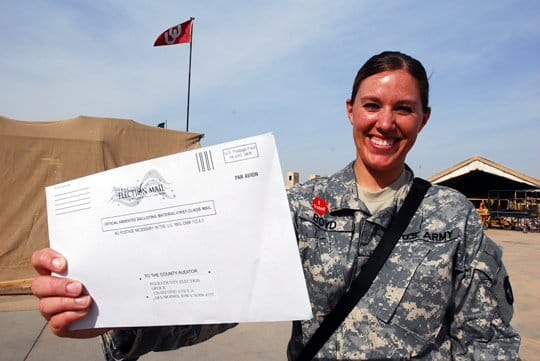Current Electoral System Discourages Military from Participating

Credit: Prospect.org

The United States military could quite possibly be the last nonpartisan government-controlled entity the country has. The reason for this, according to top brass, is that politics simply doesn't play a role in the military.
In fact, military members are strongly discouraged from participating in partisan political activities. The military examines its force in a variety of ways, but when it comes to politics the DoD steers clear of questioning troops about their individual political views.
One thing is certain however, military members vote in considerably higher numbers than the civilian population, and, according to Time Magazine, when they do, they tend to vote conservative. This could be one of the reasons for the spate of reports of vote tampering and fraud in the 2012 presidential election after Barrack Obama was re-elected.
According to Federal Voting Assistance Program's 2012 Post-Election Report to Congress, which examines the voting trends of the active duty military (ADM) and compares them with the civilian voting age population (CVAP), "Participation by members of the active duty military remained steady from 2008 to 2012."
While the initial participation rates for ADM appear lower than the CVAP, after adjusting for age and gender, the ADM participation rate is much higher.The report adjusts for age and gender because the military is disproportionally male and young when compared to the civilian population.
However, as with the civilian population, marriage is an important indicator of voting activity. Significantly more married military members vote, as do their spouses, when compared to unmarried military members.
Even though the number of military members casting their vote has increased, a disturbing trend has emerged. The percentage of active-duty military voters who reported not receiving their requested absentee ballot nearly doubled from 16 percent in 2008 to 29 percent in 2010, according to the Post-Election Report. The Post-Election Report details some of the reasons, but critics say that the real reason is simple: vote tampering.
It was alleged during the 2012 election season that democrats, and even the administration itself, were conspiring to keep military absentee votes from being counted because they vote conservative. While these claims have not been substantiated, it's clear that there are some serious challenges for the DoD and the FVAP to overcome.
Eric Eversole, founder and executive director of the Military Voter Protection Project says in an interview with U.S. News and World Report that "cultural hurdles" also play a part in military members not voting, and this is something that needs to be addressed as well.
"There is this idea that service members should stay out of the political process or America will not trust you," he said.
This idea echoes a blog post by Chairman of the Joint Chiefs of Staff Martin Dempsey. In June 2012, Dempsey wrote that he thought it was important to have an apolitical military, saying:
"We must understand why our military as a profession embraces political neutrality as a core value."
He added that remaining in a neutral political position was essential to keeping the trust of the American people.
"I shook my head at this," Eversole said of Dempsey's blog post. "Service members must participate in the democratic process they work to defend."
Senator John Cornyn had something to say about this, too. The Texas Republican wrote a letter to Dempsey questioning his comments and asking him to publicly encourage the military to vote.
While it's been alleged in yet more partisan bickering that the DoD has failed to provide the voting assistance that Congress requires, the more plausible reason for so many problems is that military members are not aware that assistance exists, or that assistance is available for their spouses through the FVAP, as well as problems with postal deadlines to return ballots, which range between 7 days and 22 days before election day, depending on the member's location.



